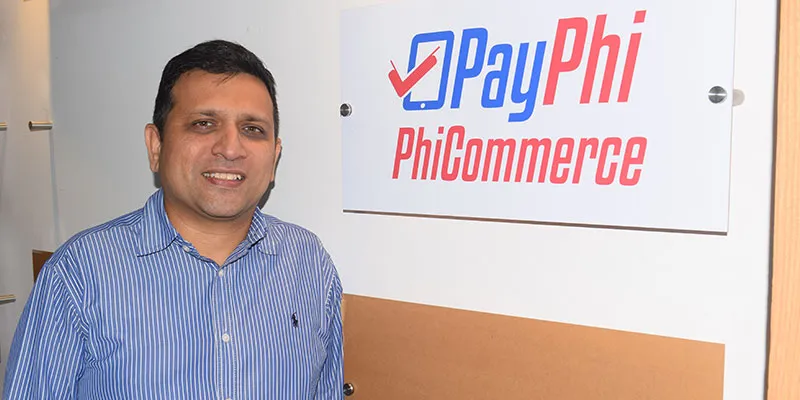How PhiCommerce is taking 'cash on delivery' online across India
The cash-on-delivery (CoD) concept caught on at a time when India was just warming up to online commerce. Indian customers loved the idea. But not all that glitters is gold and the method is not without its shortcomings. Here’s how Phi Commerce is tackling the problems the CoD method is facing.
It’s no big secret that cash-on-delivery (CoD) as a method of payment was instrumental in taking e-commerce to the masses in India. But it has had its share of problems too.
Like many others, Jose Thatil too had a difficult experience or two with CoD and realised the method required innovation to iron out the kinks.
While working in Sydney as a sales professional, Jose was used to shopping and paying for online orders in advance, but the same practice in India entailed a harrowing process while getting his purchase delivered. Repeated calls and plenty of aggravation preceded the delivery of a shipment from a well-known shopping portal.
Today, if a customer opts to pay cash, they need to be present at the time of delivery with the exact amount. Else, the delivery agent needs to come equipped with a mobile point-of-sale device.
The challenges do not end here. There are huge costs incurred by e-commerce companies just to manage the cash received from the customer, while logistics providers have additional responsibility of collecting and securely transferring the cash, an entirely cumbersome process.
On further research, Jose realised that there were more gaps among the participants—e-tailer, consumer and logistics partner—in the delivery process.
Seeing these pain points, Jose planned to set up PhiCommerce, a payment solutions company, in March 2015, to enable frictionless last-mile payments. The startup became operational in September 2015.

Apart from Jose, the business has four other co-founders, including Rajesh Londhe, Tushar Shankar, Anil Sharma and Ramkumar Subbaraj, his e-colleagues from previous jobs at Electa Card, Euronet, and ICICI Bank.
Also read: Will CoD kill the Indian e-commerce star?
Enabling CoD, the right way
After the courier partner picks up a customer’s shipment ordered on the e-commerce website, PayPhi—PhiCommerce’s transaction processing platform—picks up information on the amount and location of the order from the logistics company.
At this point, PayPhi sends all the details of the shipment as the first intimation to the customer to pay digitally, instead of using cash, in what is called the e-COD method—making digital payments anytime until the order is delivered. Jose adds,
“There is a certain trust element here, since we are being transparent and updating the customer with the entire shipment information.”
Although the payment window is open for customers throughout the delivery process, starting from dispatch from the retailer, the founders note that buyers still choose to pay only when the package reaches their doorstep.
On the day of the delivery, PayPhi again notifies the customer to pay digitally, through card, via net banking, or mobile wallets, UPI/BHIM, Bharat QR, and Aadhaar Pay.
Once the payment is made, PayPhi sends out real-time notification to the delivery boy and the consumer.
At present, the company is working with five logistic partners, including Aramex, covering close to 5,000 address pins across the country. Apart from 190 e-tailers using its service, the company is also piloting with one of the major e-commerce players in the country.
PhiCommerce makes revenue on a per transaction basis. According to Jose, the company makes 10 basis points on the size of a transaction. By end of June, the startup had processed transactions worth Rs 12 crore, with an average ticket size of Rs 800-1,000.

Upcoming plans
However, e-commerce is not the only sector PhiCommerce is interested in. Apart from the e-CoD model, the firm is also looking at the education space, and activating options for fee payments.
In an effort to take offline merchants online, Jose claims to be testing their payment solution with a few institutions in Pune, ensuring entire fee collections through Unified Payments Interface (UPI).
Further, being a repository of payment options, the company is also building an offline merchant tool allowing consumers to pay the merchant universally (through any digital payment option), while updating the merchant’s balances in real time, and settling the payment to one common account.
This deep integration eliminates the need for the merchant to have and manage multiple digital accounts, like wallet, and merchant escrow account for PoS machines, among other things.

The company is looking at organic expansion into merchant payments, food and retail payments for door delivery, and into geographies like the Middle East, Africa, as well as Southeast Asia.
Currently, the 20-member team has raised close to a million dollars in angel funding.
But PhiCommerce isn’t the only one using CoD to innovate. PhonePe, the payments arm of e-commerce behemoth Flipkart, is also building similar capabilities.
In a recent interview with YourStory, founders of PhonePe, Sameer Nigam and Rahul Chari, admitted that the process of CoD was almost nightmarish for supply chain teams as far as efficiency and cash management are concerned.
Also read: With PhonePe, Flipkart makes a quiet entry into financial services
Last April, YourStory found out that for logistics companies like GoJavas, for every successful CoD delivery, the average number of attempts is 1.24, which means it has to invest 24 percent extra manpower in last-mile delivery for CoD orders.
Although CoD contributed to a huge chunk of their revenue, logistics players agree that online payment is good for the entire ecosystem – it means faster delivery with lesser number of attempts, as well as reduces the friction in the process.
However, CoD numbers are questionable at this time, considering the cash-hoarding mentality prevalent after Indian government’s infamous move last year to demonetise high-value bills. Therefore, it is pertinent to have businesses like Phi Commerce innovating further on their business models.
Website: www.phicommerce.com







